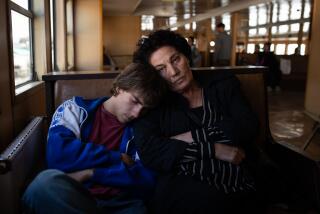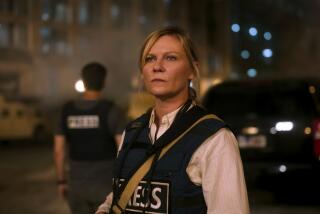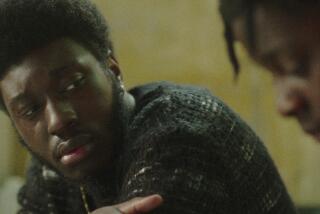‘The East’ fueled by activism
When most filmmakers in Los Angeles feel frustrated by the movie business, they pick up a pen to write out their anxiety — or pick up the phone and call their therapist.
Brit Marling and Zal Batmanglij took a different approach.
Upset by a series of Hollywood rejections four years ago, the then-aspiring actress and would-be director decided to spend the summer train-hopping with a group of idealistic drifters they’d never met. For nearly two months, they criss-crossed America, encountering strangers, diving into dumpsters and eating what they gathered, sans money.
“It was one of those things you could never imagine doing,” said Marling, 29. “Until you do it, and then you can’t imagine not doing it. Something changed in a fundamental way for us out there.”
PHOTOS: Hollywood backlot moments
The filmmaking partners channeled that transformative experience into the socially conscious thriller “The East,” the sophomore collaboration between Marling (actor, writer, producer) and Batmanglij (director, writer, producer), who two years ago made the well-regarded but little-seen sci-fi drama “Sound of My Voice.”
The 2009 trip affected their moviemaking generally — “what it taught us most was that we didn’t need to wait for permission to start making films,” said Batmanglij, 32. But it had a more specific influence on their new movie. “The East” centers on a group of radicals known as freegans — environmental activists who live off the grid and plan acts of eco-terrorism they call “jams” — whose communal way of life mirrors the lives of the people the filmmakers met on their journey.
When Fox Searchlight opens “The East” on Friday, audiences will get the chance to see a rare and largely unproved genre, the activist thriller. (Though as the filmmakers — who say they were influenced by such ‘70s topical thrillers as “All the President’s Men” — point out, “The East” raises more questions than answers.) The movie aims for the propulsive pacing of a Tony Scott film — not surprisingly, as it is one of the last films on which he has a producer credit — with the spirit of an issue-oriented documentary.
As “The East” begins, Sarah (Marling) is called upon by her boss (Patricia Clarkson) at a high-powered corporate-espionage firm to infiltrate the radicals, who are hunkering down in the Pennsylvania woods. She soon becomes one of them, learning their ways and even befriending many in the group.
Led by the charismatic Benji (“True Blood’s” Alexander Skarsgard) and populated by chatty, start-a-revolution types such as Izzy (Ellen Page), the members of the East, as the collective is known, are bonded by their belief in the evils of corporations and a desire to shake up the system.
But they’re hardly united in their approach. One of the film’s distinguishing features is long conversations among group members about ethics and the acceptable limits of radicalism. Among the questions raised: Is meting out justice to those they think guilty moral even if it entails murder?
As the movie grows more tense and the jams start to unfold — they include, in an elaborate impersonation scheme, feeding oil-company executives the same poison the freegans say is being pumped into the environment — Sarah’s loyalties and belief systems are tested.
It’s a process the filmmakers hope is repeated with audiences.
“As we’ve taken the movie [in sneak previews] around the country I’ve been moved by how many people — fathers, daughters, mothers, sons — feel the film is talking to them, about subjects like activism and the environment and where we are in the world right now,” said Marling, who can flash streaks of intense sincerity. “I didn’t realize how much the movie would speak to the crisis of alienation.”
The film resonates in the post-Occupy era, when questions about corporate responsibility and greed are squarely in the mainstream. Surprisingly, though, the film went into production before the movement sprang up in cities such as New York and Los Angeles.
The filmmakers wonder whether that’s a coincidence.
“I think a lot of people right now in my and Brit’s generation are tapping into the same things,” Batmanglij said. “It’s a matter of ‘We don’t have the answers, but it’s been a long time since people were really asking the questions.’”
On set, Batmanglij and Marling sought to create a similar spirit. They would hold dinners with the cast and crew in which many of the issues from the film were hashed out, a kind of free-form salon where people could debate the events as though they were really happening.
Skarsgard, who attended a few of these dinners, said this culture of engagement helped his performance.
“Zal and Brit were great about not force-feeding an opinion,” he said. “It made me think a lot, about my character and the world.”
Page said the very act of tackling this part reflected something deep within her.
“We live in a part of the world where we eat too much and consume too much and throw away too much, and all that comes from a fear of impermanence and emptiness,” she said. “Making this movie helped address all of these feelings I have.”
Though Scott, who died last summer, was not involved day-to-day, delegating those responsibilities to an on-the-ground producer, Michael Costigan, he did serve as a kind of spiritual guide. Batmanglij said as a child he watched such Scott films as “Spy Games.” For “The East,” he tried to incorporate the kind of tension and plot twists familiar to Scott’s movies.
He and Marling are hoping for a bigger commercial result after “Sound of My Voice.” Centering on a cult leader who may be a con man, the movie was a favorite at the 2011 Sundance Film Festival but grossed less than $1 million in a limited release from Searchlight.
Marling also starred in and co-wrote a low-budget sci-fi pic called “Another Earth” that was at the same festival. Directed by Marling collaborator and ex-boyfriend Mike Cahill, that movie and “Sound” helped put all three, who became friends while undergraduates at Georgetown University, on the map.
Batmanglij and Marling say their filmmaking philosophy is similar even as their opportunities have grown.
Though she just finished working on her second effort with Cahill — a sci-fi pic she wrote and starred in — Marling said she’d like to focus most on acting in the immediate future. She had a role as the daughter of Richard Gere in the 2012 financial-world hit “Arbitrage,” where she also served as the film’s moral conscience, and will soon start shooting a Civil War drama.
Batmanglij, who has the kind of sensibility that could translate well into bigger-budgeted thrillers (this movie cost under $10 million), says he’s open to bigger offers. But he’s not in a rush to abandon the socially conscious piece any time soon.
“We live in a time when, because of technology and this collectivist spirit, young filmmakers can make movies and feel empowered,” he said. “I don’t want to stop doing that.”
More to Read
Only good movies
Get the Indie Focus newsletter, Mark Olsen's weekly guide to the world of cinema.
You may occasionally receive promotional content from the Los Angeles Times.











